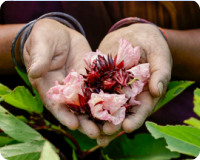

Section

How many times have you heard of the phrase “cold and flu season”? Certainly, the time of year isn’t the only reason people get sick in the late fall and winter. If we look at illness from the Ayurvedic perspective, getting sick has to do with an imbalance in doshas — not only your body’s dosha, but also the dosha of the mind, season, and environment. While we may attribute colds and flu susceptibility to a depressed immune system, the Ayurvedic perspective is far more encompassing. When all is in balance, your body provides you with good health even when everyone else is getting sick — this is also what Westerners refer to as “having a strong immune system.” One of the many ways Ayurveda creates balance is with herbs, and Ashwagandha is often the first choice to face the change of seasons from warm to cool to cold.
The cold and flu season comes on the heels of a transition from the hot and sunny days of summer, which is Pitta in nature, into the breezy Vata dosha of fall, and then into the cold Kapha season of winter. According to Ayurveda, writes Jeff Perlman of LA Yoga, the Vata dosha is responsible for regulating the immune system, and Kapha dosha has to do with the respiratory and nasal systems. Avoiding colds has to do with keeping the mind and body in harmony with the environment and balancing the doshas.
The Mind and Stress
It’s been well established that stress can weaken the immune system. Stress creates a chain reaction from an interaction between mind and body. Vanashree Belgamwar, Minnesota Ayurveda practitioner, explains that the mind can easily initiate sickness in the body. In Ayurveda, this is called prajnaparadha — an offense against wisdom or intellect.
Hans Selye, the mid-20th century physician popularized and defined the concept of stress and taught that it leads to hormonal changes, resulting in any number of diseases or symptoms, including what we call colds and flu. According to Selye, stress is not limited to the mind alone and may include prolonged food deprivation, the injection of a foreign substance, or even a hardy exercise routine. Selye’s idea of stress included not only nervous stress, but also “the nonspecific response of the body to any demand.”
We often see stress taking subtler forms, such as anxiety, worry, depression, overexcitement, and even overworking the mind or body. Therefore, because Ashwagandha is an adaptogenic herb— a plant that balances stress — it’s likely to be helpful. In more scientific terms, the herb balances the hypothalamus-pituitary-adrenal axis, which is a set of three hormonal glands that are activated during stress.
The Immune System
The key to staying healthy is a fine-tuned immune system. Medical writer Renee Bacher time and explains that the immune system creates, stores, and distributes white blood cells that fight bacteria and viruses, especially during cold and flu season. Bacher also notes that a healthy outlook may be good for your health, as evinced by a study of law students whose immune systems kept pace with their thoughts about how tough school would be. When the students felt better about school, their immune systems worked better, but with too many worries, their immune systems slowed. The upshot is that looking on the bright side might better equip your body to fight illnesses — from the common cold to more serious conditions.
Ashwagandha has been one of the most relied-upon herbs in Ayurveda for thousands of years, long before modern science came up with the terms “adaptogen,” “stress,” and “cold and flu season.” Without the holistic paradigm of Ayurvedic healthcare, it may be easy to overlook the power of the mind and spirit to create or resolve imbalances that cause health issues. When you start with the mind, you end up with a decent chance of coasting through seasonal changes in good health.





